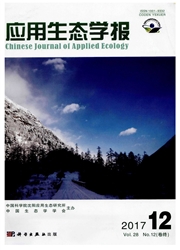

 中文摘要:
中文摘要:
稻田为鱼类等水产生物提供生境,稻田养鱼在提高水稻产量的同时,通过控制病虫害的暴发以及充分利用养分来降低化肥农药的使用.但田鱼对稻田资源的摄食(浮游植物、杂草、浮萍、田螺)及利用后转化成养分对水稻生长发育的促进作用尚缺乏研究.本研究设计了2个田间试验,通过摄像观察稻鱼系统中田鱼的活动,采用稳定性同位素分析田鱼对稻田资源的摄食,并测定水稻的生长发育进程和水稻产量.结果表明:与鱼单养处理相比,稻田养鱼显著地促进了田鱼的活动频率并扩大了田鱼的活动范围.在稻鱼共作不投喂饲料处理下,稻田中3类水生生物(浮萍、浮游植物、田螺)对田鱼食谱的贡献率分别为22.7%、34.8%和30.0%;而投喂饲料处理下,这3种水生生物对田鱼食谱的贡献率分别为8.9%、5.9%和1.6%,饲料的贡献率为71.0%.与水稻单作比较,稻鱼共作处理显著增加水稻分蘖期和灌浆期的叶片氮含量,延长分蘖期10~12 d,并显著提高成穗率和产量.表明稻鱼系统通过田鱼摄食稻田资源并转化为水稻可利用养分,促进了水稻生长,实现了水稻产量的提升.
 英文摘要:
英文摘要:
Rice field can provide habitat for fish and other aquatic animals. Rice-fish coculture can increase rice yield and simultaneously reduce the use of chemicals through reducing rice pest occurrence and nutrient complementary use. However, how fish uses food sources (e.g. phytoplankton, weeds, duckweed, macro-algal and snail) from rice field, and whether the nutrients releasing from those food sources due to fish transforming can improve rice growth are still unknown. Here, we conducted two field experiments to address these questions. One was to investigate the pattern of fish activity in the field using the method of video recording. The other was to examine the utilization of field resources by fish using stable isotope technology. Rice growth and rice yield were also examined. Results showed that fish tended to be more active and significantly expanded the activity range in the rice-fish coculture compared to fish monoculture (fish not living together with rice plants). The contributions of 3 potential aquatic organisms (duckweed, phytoplankton and snail) to fish dietary were 22.7%, 34.8% and 30.0% respectively under rice-fish cocuhure without feed. Under the treatment with feed, however, the contributions of these 3 aquatic organisms to the fish dietary were 8.9%, 5.9% and 1.6% respectively. The feed contribution was 71.0%. Rice-fish cocuhure significantly increased the nitrogen concentration in rice leaves, prolonged tillering stage by 10-12 days and increased rice spike rate and yield. The results suggested that raising fish in paddy field may transform the nutrients contained in field resources to bioavailable for rice plants through fish feeding activity, which can improve rice growth and rice yield.
 同期刊论文项目
同期刊论文项目
 同项目期刊论文
同项目期刊论文
 期刊信息
期刊信息
